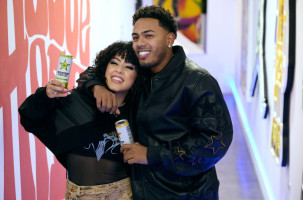Rebeca León was a 23-year-old with an art history degree when she ran into a good friend working at EMI Latin who sold her on a career in music. "It sounded amazing," says León, noting that at the time, Latin labels were opening up shop in Miami and Latin music was exploding with the help of stars like Shakira, Ricky Martin and Marc Anthony.
Born in Miami to Cuban parents, León figured she'd work at a label engineering more such crossover acts, and faxed her résumé to Sony Latin. When that didn't work, she befriended the label's receptionist and asked her for the name of the temp agency that had hired her. A few weeks later, León was called in as a temporary assistant and began a career during which she has worked at record companies, in management and for AEG Live's Latin division, which she headed for a decade before launching her own management and content company, Lionfish, in 2017, in partnership with Colombian star Juanes.
"I lived the very end of the best [time in the Latin music industry], and the beginning of the worst," the straight-shooting, high-energy executive recalls from her home office in Los Angeles' Studio City. "The adjustment of making no money -- that's when you learn how creative you are, how resourceful you are."

As one of the few female managers in the Latin business, León, 43, oversees the career of Juanes and, since 2014, manages J Balvin with Fabio Acosta and now Universal Music Group. Lionfish also recently joined Pharrell Williams, Caron Veazey of I am OTHER and Ron Laffitte of Patriot Management in a venture to develop content and manage other acts, such as up-and-comers Matt Hunter, Sky, Rosalia and Fuego. "We have identified artists who are bilingual, who are bicultural, who can become global artists very easily," says León.
Latin music hit a particularly rough spot about 10 years ago. What helped it start to rebound?
Social media. All these platforms. Streaming. The numbers don't lie. When you have a group of people who have never bought music -- because that was the problem with Latin America, they would consume music illegally -- and you finally have a barometer on their consumption and have it represent money for the labels, that's a turning point. Once you realize [the Latin market] is hyper-consuming music, that's a game-changer. And a lot of that has to do with reggaetón and the fact that reggaetón is a community and they support each other. One person puts out a song and everybody posts about it. They multiply their power. I believe it has to do with them being the underdogs for so long. They were rejected by mainstream media, so they came together to support each other ... even if they're not on [the same] track.

What challenges have you faced as a woman in this industry?
My biggest challenge was breaking the social paradigms that I grew up with, and understanding that I really do have the power to do what I want to do. I did have to learn to negotiate. It wasn't something that was innate to me. There's this woman, Reshma Saujani [an American lawyer and founder of tech organization Girls Who Code], who teaches girls bravery, not perfection. Girls do not go out and take chances the way guys do. They go out after things they think they're going to get.
Has your experience as a Latin woman been different?
In the mainstream market, I'm looked at more as a minority because I'm Hispanic than because I'm a woman. But if I were to get caught up in the challenges I would have never left the house. Maybe it's harder to be a woman or a Latina, maybe it's easier. There's a give and take. The most important thing is to find your power, not be afraid and to teach young girls about the business. Tell them, "If you go into this career path, your salary cap will be this." We need to talk not just about dreams but the consequences. When you are in a profit center [for a company], a position that helps bring in money, your salary has a bigger potential than being in a service-oriented position like marketing or PR, which is where many women gravitate to in the Latin music business. I realized that when I went to AEG and started selling tours.

It's surprising that there hasn't been more fallout in the Latin music industry from the #MeToo movement.
In Latin, there's definitely a lack of representation of women in the music business that don't use sex as a commodity [as artists]. We need to shine a light on content creators that don't objectify women. I'm not saying it's not fine to have a sexy girl in a video. But as an artist, or an executive, you shouldn't have to do that. We need more examples of girls that don't objectify themselves.
To break a Latin act in a big way, do you need to associate with a big name like Pharrell?
Not necessarily. Look at Angelo Medina [Ricky Martin's manager at the time he broke into the mainstream]. For me, the decision to go with Ron and Pharrell and Caron was about chemistry. I was approached by a lot of management companies and I felt a lot of them only wanted to check a Latin box. I didn't feel they saw it that way. We're also developing content for TV and film. We just sold a scripted series about music that takes place in Colombia to Amazon with Ben Silverman and Jay Weisleder at Propegate; Juanes and I are executive producers. We are also developing a talent show about reggaetón with Pharrell and Balvin that we are currently pitching, in addition to a film project with Balvin. In the content world, Latin doesn't have those TV shows that break songs. We need to create that content that allows music to live and breathe in another dimension.

One of your big successes has been helping take José "J" Balvin from local Colombian artist to global star. What was the strategy?
You had never really heard reggaetón like that. Colombians are so well-spoken. They made this music that was [reggaetón rhythm] dembow, but it was so mainstream, and it wasn't vulgar. And José is such a star. We have incredible partners with Universal [which has co-managed Balvin since 2017]. It was huge how they made concentrated efforts across the globe to push his songs on all platforms and look for opportunities to raise his profile. Add to that the fact that Colombian fans are incredibly supportive on social media and YouTube, and José made it.

This article originally appeared in the April 21 issue of Billboard.








